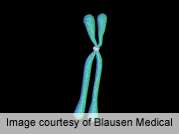(HealthDay)—Modifiers of cancer risk have been identified for BRCA1/2 mutation carriers, according to a review published online May 13 in the Journal of the National Cancer Institute.
Tara M. Friebel, M.P.H., from the University of Pennsylvania Perelman School of Medicine in Philadelphia, and colleagues conducted a systematic review of the literature to identify factors that are associated with cancer risk modification in BRCA1/2 mutation carriers. Forty-four non-overlapping studies that met predefined quality criteria were included in fixed effects meta-analyses.
The researchers found that the only variable that produced a probable association was late age at first live birth, which was associated with a decreased risk of breast cancer in BRCA1 mutation carriers (effect estimate: 0.65; 95 percent confidence interval, 0.42 to 0.99 for women aged 30 years or older versus women aged younger than 30 years). A similar association was seen for women aged 25 to 29 years versus those aged younger than 25 years (effect estimate, 0.69; 95 percent confidence interval, 0.48 to 0.99). For BRCA1 mutation carriers, breastfeeding and tubal ligation correlated with reduced ovarian cancer risk, while for BRCA1/2 carriers, oral contraceptives correlated with reduced risk. In BRCA2 mutation carriers only, smoking correlated with increased breast cancer risk.
"There is a critical need for improved risk assessment for women with BRCA1/2 mutations and a need to reduce risk in this high-risk population," the authors write. "The data presented here may be of value in developing more meaningful risk assessment tools, including statistical models, and approaches for reducing cancer risk in BRCA1/2 mutation carriers."
More information:
Abstract
Full Text (subscription or payment may be required)
Journal information: Journal of the National Cancer Institute
Copyright © 2014 HealthDay. All rights reserved.





















